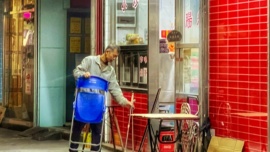Macau Business Editorial | January 2024 | By José Carlos Matias – Director
“Has gaming in Macau become ‘that which must not be named?'”, someone asked at a conference elsewhere in the Asia-Pacific region last year.
While it might be overstating things to give it taboo status just yet, the question does reflect a perception around the broader issue of the 2022 gaming public tender’s non-gaming focus and the magnitude of the operators’ commitments on non-gaming investments under the new gaming concessions.

At some point, a couple of years ago, some voices even speculated about whether the authorities’ endgame might involve phasing out casino gaming in the mid-to-long term. After all, how could the industry continue to shine with the near extinction of junkets (and the significant funds they brought in) and the screw-tightening from new gaming-related regulations and measures being implemented locally and across the border?
One year into the gaming industry’s ‘new era’ has shown us those concerns – though understandable at the time –are thankfully not holding water. Macau’s resilience combined with its persistent allure, especially for those hailing from mainland China and Hong Kong, resulted in sound recovery for gross gaming revenue (GGR) in 2023 (MOP183 billion), which despite being just 62 per cent of pre-pandemic levels is way beyond the most optimistic guesses hazarded a year ago. More importantly, year-end GGR figures (December) recovered to 81 per cent of 2019 levels.
Some analysts are already belittling the Government’s MOP216 billion GGR forecast for 2024 as “easily surpassed”. As our readers will know, we are not in the habit of jumping on the crystal ball bandwagon: we neither bought into astronomic sky’s-the-limit predictions during the last decade’s heyday nor foretold of the “coming collapse” at the low-ebb of COVID-19, particularly in 2022. What is crystal clear, though, is that the pace of recovery bodes well not only for Macau’s economy but for the new gaming revenue structure that emerged in the post-pandemic part of last year. The much-anticipated rise to supremacy of mass-market GGR is now a reality (with late 2023 levels outpacing 2019 levels), and VIP-generated revenue has taken a back seat. Nevertheless, as we explore in this issue’s special report, the junket sector’s near-demise was not an extinction event for high rollers. Far from it. Experts in our special report reveal they can still be found in company-direct VIP rooms and on gaming floors – as premium-mass customers.
What this suggests is that post-COVID pent-up demand and management by authorities on both sides (SAR and mainland) have been key factors, the latter reflecting an essential political dimension that warrants deeper analysis. Add to that the operators’ ability to adjust to an evolving and more sophisticated clientele, and this is where we find an integrated, organic intertwining of gaming and non-gaming: namely through providing new experiences for visitors in terms of shows, performing arts, entertainment, sports events, dining, retail, and so on. Indeed, “diversification” is no longer just a buzzword; it’s now also the keyword. And we’re already seeing results. Yet it’s only early stage in the 10-year concession period, and there is still a long way to go to reach the ambitious targets set by both government and operators.
It would be a disappointment to see the city resign itself to its massive Greater China market comfort zone, failing to live up to the World Tourism and Leisure Centre mantra. Yet with the tourism authorities showing themselves increasingly proactive in promoting the SAR abroad, alongside the “Big Six” and other players, it’s within reason to hope for a much-needed boost in international visitation this year. To that end, more flights, easier mobility and skilled multilingual professionals will be key.
Meanwhile, the laudable focus on Macau’s urban revitalisation and its “City of Performing Arts” and “City of Sports” ambitions is being delivered in a de facto “public-private partnership” between the government and gaming concessionaires. But therein lies an important duty to fine-tune those arrangements and keep an eye out for dysfunctions.
Rather than ‘that which must not be named’, the history of Macau has shown gaming to be the ‘Chosen One’. And while addressing its side effects, a focus on maximising the gaming industry’s contribution for the greater public good while fostering diversified, inclusive, and sustainable economic development stands as the quintessential undertaking for the SAR in this decade. What awaits us further down the road hinges on getting this leg of the journey right.
























